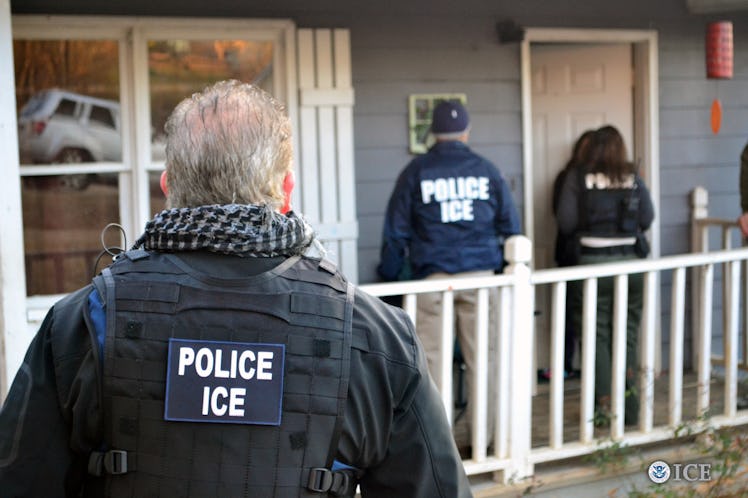
Here's What You Need To Know About ICE Raids
Several cities around the United Sates recently started preparing for a series of Immigration Customs Enforcement (ICE) crackdowns on migrant families. After a series of tweets from the president in which he said ICE would begin deporting people "who have illicitly found their way into the United States," it's important to know the answer to the question: What is an ICE raid? Here's what you should know about how to respond, and where they're slated to happen.
On Monday, June 17, President Donald Trump tweeted that ICE would start targeting and deporting "millions of illegal aliens" living in the United States, who entered the country through the southern border. Per CNN, the raid would have affected 2,000 migrants living in the 10 targeted cities. But, five days later, on Saturday, June 22, Trump tweeted that at the request of Democrats, he would delay the deportation process for two weeks to see if politicians, both Republicans and Democrats, could find a "solution to the asylum and loophole problems at the southern border." In a separate tweet, he stated that this bipartisan plan "[p]robably won’t happen," and after two weeks, the "big deportation" begins. The White House did respond to Elite Daily's request for further comment on President Trump's decision to delay the raid.
So, what is an ICE raid, and how does ICE deport people? ICE, a law enforcement agency housed within the Department of Homeland Security, has the power to arrest and deport migrants who don't have legal status in the United States, per the agency's website. According to CNN, for the purposes of the planned raid, ICE reportedly worked with the Justice Department on the "family expedited docket," and in February 2019, ICE sent 2,000 letters to migrant families who had reportedly been given final orders of removal, asking them to self-report to ICE offices by March. On Friday, June 21, ahead of the delayed raids, ICE released a statement that didn't go into detail about the planned raids, saying, "Due to law-enforcement sensitivities and the safety and security of U.S. Immigration and Customs Enforcement personnel, the agency will not offer specific details related to ongoing enforcement operations before the conclusion of those actions."
According to Fortune, ICE raids generally happen when Enforcement and Removal Operations (ERO), a subset of ICE, obtain known addresses of targeted migrants, and they look to detain that person with the use of an administrative warrant.
On June 21, before Trump tweeted about the temporary reversal on his order, the Miami Herald reported that ICE was slated to target 10 cities for migrant crackdowns, including Miami, Florida; Atlanta, Georgia; Chicago, Illinois; Baltimore, Maryland; Denver, Colorado; Houston, Texas; Los Angeles, California; New Orleans, Louisiana; New York City, New York; and San Francisco, California. In the wake of the news, civil rights and migrant rights organizations like the ACLU, RAICES, United We Dream, and the National Immigration Law Center started sharing resources to help migrants and allies understand what rights people have when ICE comes knocking.
These resources present important information for what to do if ICE agents show up at the door and what rights migrants have when ICE is at their home or workplace. The American Civil Liberties Union's (ACLU) Know Your Rights graphic notes the rights migrants have when ICE agents show up at their home. It states:
- Migrants do not have to open the door.
- Migrants have the right to ask why ICE is there and ask for an interpreter.
- Migrants have the right to ask for a warrant signed by a judge with the correct name and address of the home to be searched.
- Migrants have the right to remain silent and ask people in the household to not share any information.
- Migrants have the right to remain silent if arrested and should not sign anything until speaking with a lawyer.
Another ACLU graphic tackles knowing your rights if ICE agents show up at your place of work. The graphic explains:
- Migrants have the right to ask to leave, and may "calmly walk out."
- Migrants have the right to refuse a search of belongings and workspace.
- Migrants have the right to remain silent and do not have to discuss immigration status.
- Migrants should remain silent if arrested, until a lawyer is present.
- Migrants have the right to record the interaction with ICE, as long as it does not interfere.
Immigrant rights allies can also respond to ICE raids by contacting local immigrants rights groups to see how you can help be a part of rapid response teams to track ICE's presence in your neighborhood. You can also share the "know your rights" resources about ICE raids widely on social media. You can donate to organizations that help migrants, like the ACLU and the Refugee and Immigrant Center for Education and Legal Services (RAICES). To help change the current system to prevent massive raids in the future, you can also help by using your vote to support politicians with progressive immigration plans.
There will likely be more updates to the status of ICE raids and migrant deportations over the next two weeks, and you can also stay tuned as to what Congress will do in response to President Trump's message regarding immigration reform. In the meantime, it's important for migrants to know their rights and for allies to know how they can help.